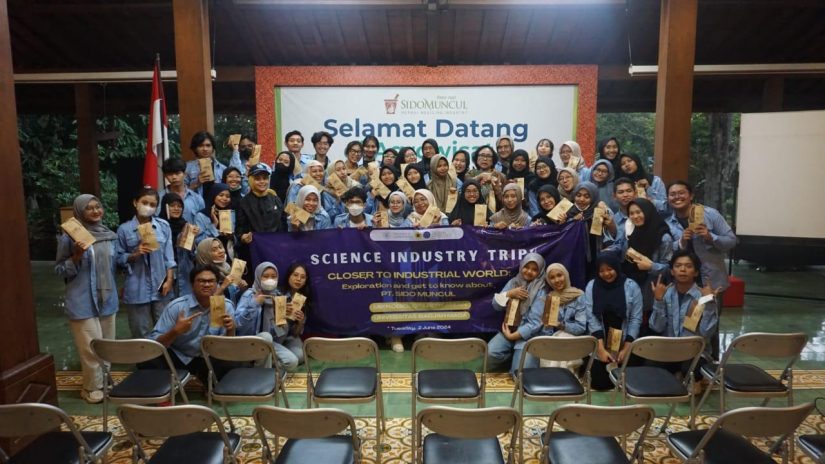
The Agricultural Microbiology Student Association (PERMAHAMI), in collaboration with the Department of Agricultural Microbiology, organized an industrial visit to PT Industri Jamu dan Farmasi Sido Muncul Tbk. located in Ungaran, Semarang, attended by 53 students and accompanied by two faculty advisors. The visit, held on Tuesday, July 2, 2024, aimed to provide knowledge and experience in understanding firsthand how the concepts studied in the classroom are applied in real-world practice.
The visit was received by the Public Relations of PT Industri Jamu dan Farmasi Sido Muncul Tbk, Mrs. Ami, and began with an explanation of the rules while at the industrial location. Ami explained that after the COVID-19 pandemic, Sido Muncul limited company visits to minimize the transmission impact. Ami further explained that Sido Muncul has a vision to become a pharmaceutical company, traditional medicine, health food and beverages, cosmetics, and herbal processing that benefits society and the environment.
“We hope to continuously develop herbal medicine research and help and encourage the government, educational institutions, and the medical world to play a more significant role in researching and developing herbal medicines and treatments,” Ami added.
After the welcome address, the group was invited to tour the company, starting from the raw material warehouse for simplicia and non-simplicia, primary product packaging, secondary packaging, research and development covering the formulation laboratory, production laboratory, microbiology laboratory, instrumentation laboratory, PCR laboratory, and pharmacology laboratory, packaging materials warehouse, liquid dosage form production, and final packaging.
The activity continued with a tour of the Agrotourism area of PT. Industri Jamu dan Farmasi Sido Muncul Tbk. This special area, established in 1999, aims to collect medicinal plants and preserve genetic resources, with a particular focus on rare or nearly extinct plants. Students had access to view the agrotourism area, which houses more than 400 plant species and 154 animals from 52 species, including Sumatran and Siberian tigers, crocodiles, snakes, and Bornean orangutans.
The visit continued with a discussion and Q&A session involving representatives from Sido Muncul, accompanying lecturers, and students. In this session, as a representative of the lecturers, Desi Utami, S.P., M.Env.Sc., Ph.D., expressed gratitude to PT. Industri Jamu dan Farmasi Sido Muncul Tbk for the opportunity to visit.
“We hope for more collaboration between the Department of Agricultural Microbiology UGM and Sido Muncul, both in the form of sending students for fieldwork programs, Merdeka Belajar – Kampus Merdeka (MBKM), as well as research collaborations. Cooperation between universities and industry is very important to create an inclusive and high-quality educational environment, with the hope of increasing benefits for both parties,” said Desi.
The discussion and Q&A session provided a lot of new knowledge to the students, one of whom was Severinus Adrian Maitri from the 2023 batch of Agricultural Microbiology.
“The industrial visit to Sido Muncul opened my eyes to the vast field of microbiology. Seeing the various labs as part of the R&D department changed my perspective on working in a lab. As a student who initially felt reluctant to spend a long time in the lab, I gained a new perspective that laboratory work is something not everyone can do. Lab workers are at the forefront of innovation, expected to impact the wider community and serve knowledge, showing that pursuing education is worthwhile,” concluded Vino.
This sentiment was echoed by the head of the industrial visit organizing committee from Permahami, Dwi Nur Cahyani.
“At PT Sido Muncul, we were able to learn about the production process to the packaging of herbal products on an industrial scale. In this visit, we gained not only knowledge but also insights into career opportunities in this field,” said Dwi.
Through this industrial visit activity, the Department of Agricultural Microbiology, Faculty of Agriculture UGM ensures the quality of education at Gadjah Mada University to achieve the SDGs point 4, which is “Quality Education.”
Author: Desi Utami
